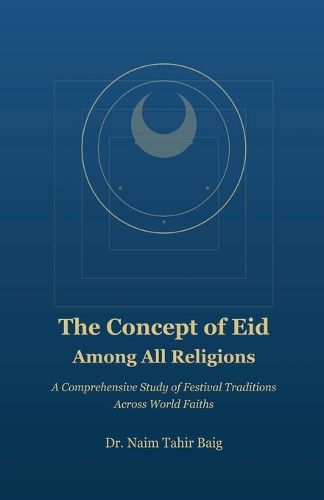Readings Newsletter
Become a Readings Member to make your shopping experience even easier.
Sign in or sign up for free!
You’re not far away from qualifying for FREE standard shipping within Australia
You’ve qualified for FREE standard shipping within Australia
The cart is loading…






This title is printed to order. This book may have been self-published. If so, we cannot guarantee the quality of the content. In the main most books will have gone through the editing process however some may not. We therefore suggest that you be aware of this before ordering this book. If in doubt check either the author or publisher’s details as we are unable to accept any returns unless they are faulty. Please contact us if you have any questions.
The Concept of Eid Among All Religions
Book Description
In this groundbreaking work, Dr. Naim Tahir Baig explores the universal human impulse to mark sacred time through communal celebration, examining how the Islamic concept of Eid finds remarkable parallels across the world's diverse religious traditions. Drawing on extensive research spanning five continents, this comprehensive study reveals how celebrations from Hindu Diwali to Jewish Passover, Christian Easter to Buddhist Vesak, and countless indigenous ceremonies worldwide address similar human needs for meaning, community, and transcendence-albeit through different theological frameworks and cultural expressions.
"The Concept of Eid Among All Religions" moves beyond superficial comparisons to examine the deep structures of religious festivals: their theological purposes, social functions, ritual elements, and temporal significance. Through meticulous historical analysis and contemporary observation, Dr. Baig demonstrates how these celebrations have both maintained remarkable continuity across centuries and adapted creatively to changing social conditions-from diaspora contexts to digital environments, from commercial influences to interfaith engagement.
At once scholarly and accessible, this pioneering work offers valuable insights for religious practitioners seeking deeper understanding of their own traditions, educators fostering cross-cultural appreciation, and anyone interested in how humans create meaning through sacred celebration. In an age often divided by religious difference, Dr. Baig's exploration reveals festivals as potential bridges of understanding-honoring the unique while celebrating the universal dimensions of humanity's diverse spiritual expressions.
$9.00 standard shipping within Australia
FREE standard shipping within Australia for orders over $100.00
Express & International shipping calculated at checkout
This title is printed to order. This book may have been self-published. If so, we cannot guarantee the quality of the content. In the main most books will have gone through the editing process however some may not. We therefore suggest that you be aware of this before ordering this book. If in doubt check either the author or publisher’s details as we are unable to accept any returns unless they are faulty. Please contact us if you have any questions.
The Concept of Eid Among All Religions
Book Description
In this groundbreaking work, Dr. Naim Tahir Baig explores the universal human impulse to mark sacred time through communal celebration, examining how the Islamic concept of Eid finds remarkable parallels across the world's diverse religious traditions. Drawing on extensive research spanning five continents, this comprehensive study reveals how celebrations from Hindu Diwali to Jewish Passover, Christian Easter to Buddhist Vesak, and countless indigenous ceremonies worldwide address similar human needs for meaning, community, and transcendence-albeit through different theological frameworks and cultural expressions.
"The Concept of Eid Among All Religions" moves beyond superficial comparisons to examine the deep structures of religious festivals: their theological purposes, social functions, ritual elements, and temporal significance. Through meticulous historical analysis and contemporary observation, Dr. Baig demonstrates how these celebrations have both maintained remarkable continuity across centuries and adapted creatively to changing social conditions-from diaspora contexts to digital environments, from commercial influences to interfaith engagement.
At once scholarly and accessible, this pioneering work offers valuable insights for religious practitioners seeking deeper understanding of their own traditions, educators fostering cross-cultural appreciation, and anyone interested in how humans create meaning through sacred celebration. In an age often divided by religious difference, Dr. Baig's exploration reveals festivals as potential bridges of understanding-honoring the unique while celebrating the universal dimensions of humanity's diverse spiritual expressions.